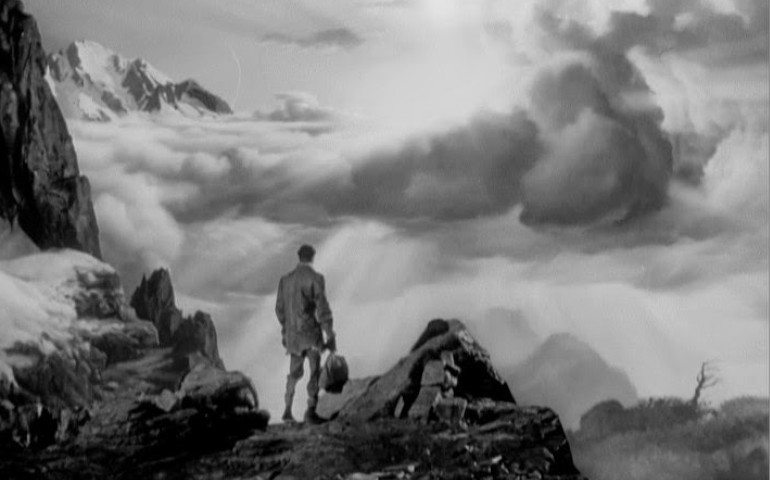
It appeals for its attractive settings: the interwar period, with Paris as the crossroads of the world and the Côte d'Azur as a haven for millionaires and artists. Larry is a young American, a volunteer pilot in World War I who is deeply affected by the death of a comrade who died saving his life. This experience will lead him to break off his engagement to Isabel Bradley, a wealthy Chicago heiress, and to begin a pilgrimage around the world in the hope that the libraries of philosophy and literature will give him some answer to the traumatic experience he has lived through. Isabel refuses to accompany him on this pilgrimage, as it would mean giving up the life of parties and luxury that she has always desired. That life will only be given to her if she unites with a millionaire, Gray Maturin, and marries him. Meanwhile, Larry's spiritual concerns lead him to work in a mine in Belgium, on a farm in Germany and even in a Benedictine monastery in France. Finally, he sets out for India, where he meets a guru, Shiri Ganesha, who radiates serenity, kindness and peace. The young man believes he has found ultimate happiness there and returns to the USA, after passing through France, in order to lead a hidden life, as a mechanic or cab driver, which will support him in leading a life of "serenity, charity, compassion, detachment and coherence".
Many readers of The razor's edge They admire Larry's spiritual itinerary towards Eastern philosophies. Such philosophies triumph today because they replace the arduous path of the encounter with a personal God with the search for the Absolute, translated into an inner peace that safeguards the individual from life's sorrows. I have approached the novel many times in an attempt to understand Larry, but it has finally dawned on me that I must first understand Maugham and his life experiences. He lost his parents at an early age and was educated by a rigid Anglican vicar from the age of 10. He had to study, without much conviction, the career of Medicine in London, and abandoned it all for his vocation as a writer. Later, he would become famous through theater, novels and film scripts. His success helped him to buy a residence, the Villa Mauresque, in Cap Ferrat, where he would confine himself to write; a case that reminds me of Vicente Blasco Ibáñez, also confined to his Fontana Rosa in the not so distant Menton. In my opinion, in their confinement both authors had to experience irreversible wounds in their own souls and in those of their main characters. The British writer protected himself, moreover, with a pose of cynicism.

Larry has many such wounds. A Benedictine monk, Father Ensheim, says of him that he is a deeply religious man who does not believe in God. This statement is in keeping with that famous one. prophecy by André Malraux, which "the 21st century will be religious or it won't be.". But certain spiritualities, not religions, are an expression of individualism. They experience satisfaction in doing good and helping others, although not always with sufficient empathy. Perhaps the weak point of these good intentions is that the needy, especially if they are seriously ill or miserably poor, may revolt against their benefactors and the latter may flee in horror. Protest, born out of desperation, reveals that there are benefactors who are only out for themselves.
Larry confesses to a friend that he would have liked to live in the Middle Ages, when faith was felt without thinking about it. Now it is impossible, because he has not been given the gift of faith. The young man refuses to accept Ensheim's advice that if one behaves as if one has faith, faith will be granted to him. Nor does he understand that a son would turn to his Father in the Lord's Prayer to ask for his daily bread. Why ask it of an omnipotent Creator who knows what his children need? Why praise God daily? Can heaven be bought by flattery?
I conclude that Larry, and Maugham himself, have had a rigid upbringing, hardly Christian in name. Faith has been reduced to sentiment, works do not matter for salvation. Sin is not only personal but also an effect of social conditioning. Consequently, religion is for the individual. The sense of belonging to a community, or the concept of God as Trinity, is diluted. The resulting dissatisfaction no longer awaits a Savior, and one only aspires to a psychic well-being, without major commitments, which one believes to have found in Eastern religions.
Antonio R. Rubio Plo
Degree in History and Law
International writer and analyst
@blogculturayfe / @arubioplo